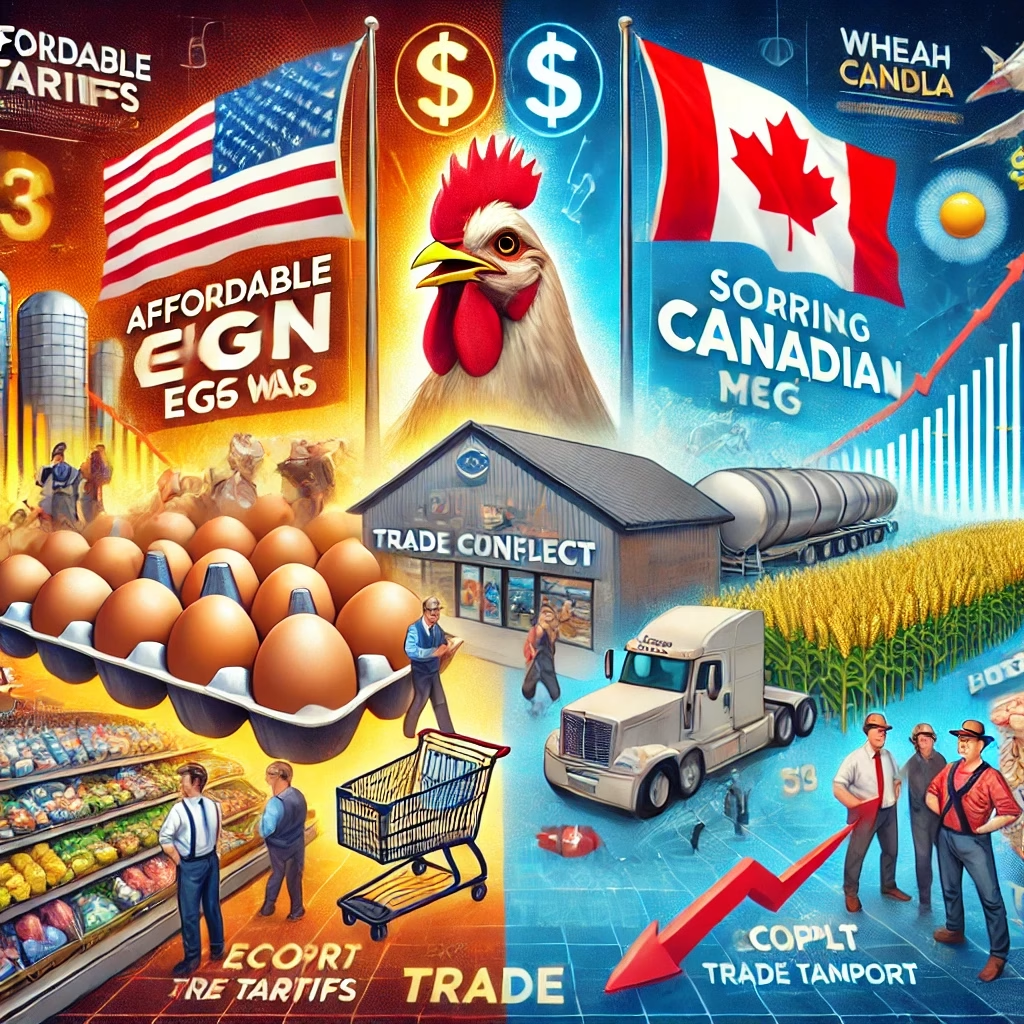
IPTV Business Desk🥚Canadian eggs remain affordable and widely available, even as egg prices in the United States continue to soar. The secret lies in Canada’s supply management system, a regulated framework that maintains stable prices and ensures domestic agricultural production meets demand.
As trade tensions between the U.S. and Canada escalate, with the U.S. administration under President Donald Trump imposing tariffs on Canadian goods, Canada has responded with strategic economic measures. While both nations face the impacts of this trade war, Canadians continue to benefit from consistent prices on essentials like eggs, milk, and fuel.
Why Canadian Eggs Stay Affordable During the U.S. Trade War
📊 Egg Production and Agricultural Stability
Amid the trade war, the question arises: Is Canada having an egg shortage? Fortunately, no. Canada’s supply management system ensures a stable egg supply. Unlike the U.S., which has faced price volatility due to avian flu outbreaks and supply chain disruptions, Canada has maintained consistent production.
📊 Egg Production Over the Years:
- 2024: 9.5 billion eggs
- 2023: 9.2 billion eggs
- 2022: 9 billion eggs
In addition to eggs, Canada produced over 1.4 billion kilograms of chicken meat in 2024, up from 1.35 billion in 2023. Chicken remains a staple in Canadian households, and the poultry industry benefits from similar protectionist policies.
💡 Why are eggs cheaper in Canada?
- Regulated Supply: Controls on production prevent oversupply or shortages.
- Stable Pricing: The government maintains fair prices for consumers and farmers.
- Tax-Free Status: Eggs are exempt from GST, keeping costs low.
🔎 Price Comparison:
- Canada (March 2025): CAD 3.90 (USD 2.72) per dozen
- U.S. (March 2025): USD 4.15 per dozen
🥛 Milk Prices and Domestic Protection
Canada’s dairy sector also operates under a supply management system, shielding it from international market volatility. While milk prices vary by province, it typically ranges between CAD 1.60 to CAD 2.50 per liter.
Why the Difference?
- Canadian farmers benefit from stable prices and predictable incomes.
- U.S. dairy farmers face price fluctuations and oversupply challenges.
- American producers frequently advocate for greater access to Canadian markets.
📦 Imports and Exports
While Canada primarily relies on domestic production, it does import eggs to address minor supply gaps. In 2024, Canada imported approximately 50 million eggs from various countries, including the U.S., accounting for less than 1% of the national consumption.
🌾 Top Canadian Agricultural Exports to the U.S. (2024):
- Wheat: 7 million metric tons
- Pork: 1.3 million metric tons
- Maple Syrup, Canola, and Seafood
⛽ Fuel and Energy Prices
The trade war has also sparked concerns over petrol prices. As a major oil producer, Canada benefits from energy independence, but the industry remains susceptible to global price shifts.
Current Fuel Prices (March 2025):
- Canada: CAD 1.60 to CAD 1.90 per liter (USD 4.50 to USD 5.30 per gallon)
- U.S.: Higher due to ongoing tariff measures
💬 Canadian officials are considering additional taxes on energy exports to the U.S. as part of their retaliatory measures.
🏁 Conclusion
While trade tensions escalate, Canada’s proactive policies in agriculture and energy provide resilience. The supply management system has shielded Canadian consumers from drastic price hikes seen in the U.S. By promoting internal trade and local sourcing, Canada continues to mitigate the economic impact of the ongoing trade dispute.
However, as negotiations continue, both nations face increasing pressure to find a diplomatic resolution before further economic damage is done.
“Canada Holds Steady Amid U.S. Trade War: How Supply Management Shields Consumers from Rising Prices”
“Eggs, Milk, and Fuel: How Canada’s Trade Policies Are Buffering Households from U.S. Tariffs”
“Why Canadian Eggs Stay Affordable as U.S. Prices Soar: The Impact of Supply Management in a Trade War”
“Trade Tensions Escalate: Canada Strikes Back with Internal Reforms and Retaliatory Tariffs”
“Canadians Pay Less for Essentials as Trade War Worsens: A Look at Supply Management Success”
“Travel Canada’s Hidden Gems: When to Go, Why to Visit, and How to Prepare”



